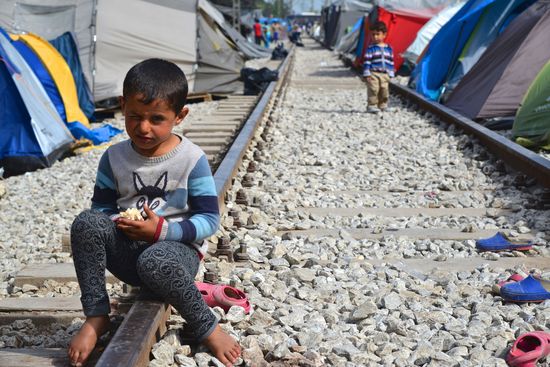Here's What "Direct-Impact Philanthropy" Looks Like for Refugees in Greece
/
Earlier this year, the Greek government closed the Idomeni refugee camp. The clearing out of Idomeni, considered one of the country’s largest informal camps, meant that over 8,000 refugees—most of them Syrians and Iraqis—would have to relocate. The Greek government’s plan was to move those who were willing to more formal, state-run encampments near Thessaloniki.
In theory, this appeared to be a sound strategy. Camps were set up in former industrial areas with large abandoned factories in warehouses, which could house a number of refugees. In practice, however, the move has prompted calls for action from human rights organizations, humanitarian groups and aid agencies due to conditions that have been described as abysmal, atrocious and “not fit for animals.”
In an article published by the Guardian, Alexandria South, a volunteer who visited a camp on the outskirts of Thessaloniki said, “There was no running water or showers or electricity or firewood. Mothers had no hot water for baby formula or to sanitise bottles, and had to use cold water.” South said that at that particular camp, there were only six chemical toilets to be shared among some 1,000 refugees.
By the end of May, the United Nations pressed Greek officials to improve the conditions of its refugee camps, which the U.N. described as “substandard.” It’s safe to assume that in a cash-strapped country on the brink of another economic collapse, those improvements will be slow to come.
Related: Thinking Outside the Tent: How These Funders Approach the Refugee Crisis Differently
At least one activist philanthropist isn't waiting around. Amed Khan, a private investor and former Clinton administration official, has been working in partnership with the Radcliffe Foundation to create housing for refugees in an abandoned textile factory in Thessaloniki.
Khan, who had been volunteering at Greek refugee camps since 2015, became incredibly exasperated with the living conditions at the camps, saying, “All this misery is caused by political problems and bureaucratic stagnation. This horrible situation can be solved.” Khan, along with his partners and the Greek government, came up with a solution—the Elpida Home Project.
Elpida is the name of an abandoned, 6,000-square-foot textile factory given to Khan and company by the Greek Ministry of Migration. The former factory has been completely transformed. Open factory floors were built out into individual housing units and common spaces that include kitchens, toilets, showers and children’s play areas. Elpida currently houses 160 refugees—referred to as “residents” there—and at full capacity, will house up to 800 refugees, many of them women and children. The $1 million bill for the renovation was footed by Khan and Frank Giustra, founder of the Radcliffe Foundation.
Giustra established the Radcliffe Foundation in 1997 to support global efforts to “alleviate poverty; enhance the welfare of children; improve public health; and/or promote and enable education.” (He's also a huge donor to the Clinton Foundation.) In 2005, the foundation began actively supporting the International Crisis Group, described its mission as “working to prevent wars and shape policies that will build a more peaceful world.” In recent years, Radcliffe has turned its attentions to helping refugees in Greece and Turkey.
Radcliffe is a practitioner of what it refers to as “direct-impact philanthropy by taking a private sector approach to aid delivery.” Its standard operating procedure is to develop both private and public partnerships as a means to affect material change in the lives of those in need. The Elpida Home Project is a perfect example of this approach.
While Amed Khan and Frank Giustra provided the financial backing to renovate the abandoned warehouse as well as funds to run the facility, that funding was only one leg of the stool.
Elpida is a joint venture with many players, including the Greek government, which is footing the bill for utilities and rent, as well as providing security. Here’s a quick rundown of other groups involved in the project:
- Together for Better Days, a grassroots volunteer group is providing volunteers to take care of the things like waste management, outdoor infrastructure, and the distribution of non-food items.
- Emergency Response Center International, a Greek humanitarian NGO is working to establish educational programs for young people and teachers that speak Arabic.
- The California-based Team Rubicon is building a medical center at Elpida, which already has doctors and nurses on site. Team Rubicon is also supplying the medical equipment to the center.
- NetHope is providing Wi-Fi that will be accessible by all Elpida residents.
- Medicins du Monde is sending psychologists in three days a week.
Related: A Tech Group Works on the Front Lines of Global Crises—and Big Funders Follow
In a press release, Giustra said the goal of the project was not only to provide safe and comfortable living conditions for refugees, but also to “restore their dignity by treating them as human beings.” Something that seems to a be in short supply these days.
As for Khan, he’s already working with the Greek government to find additional buildings that could potentially serve as Elpida-style refugee housing. But Khan and his partners don’t want to go it alone, here; they are hoping that their work will encourage and inspire others to get involved in similar projects, saying, “It costs about $700 dollars to provide humane housing for one person. I believe we are at a certain point in time that anyone who cares has to be all-in. This is a call to action.”








